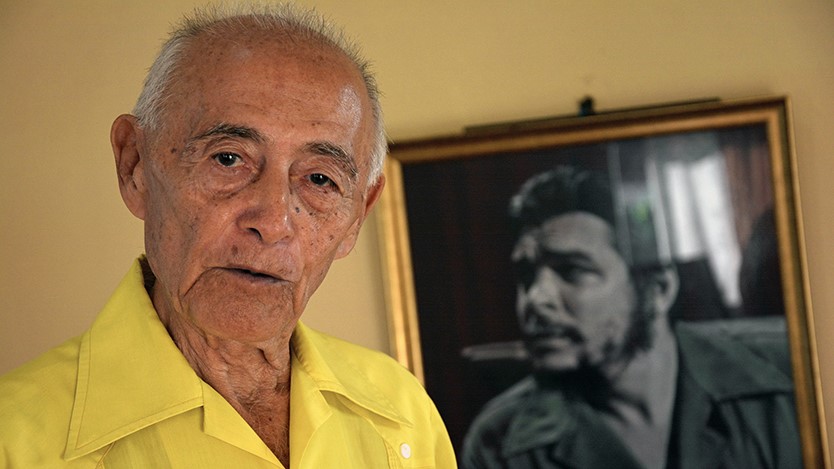
Why is it that Che has the gift of not having died on October 8, almost 56 years ago? Why humiliate him if he grew up in the face of humiliators? "Be calm and aim well! You are going to kill a man!” he told the murderous non-commissioned officer, looking into his eyes that fateful October 9, 1967.
A Cuban who was under the orders of the Guerrilla Commander reveals from the most absolute intimacy, the human qualities and love of who continues to be his Che, his boss, in combat and in daily life.Efrén de Jesús León Nápoles —León, as his relatives know him—,86 calendars, portrays him in flesh and blood, the true casing of heroes.
The lieutenant colonel (r) of the Revolutionary Armed Forces, was 20 years old when he arrived in the Sierra, with peasant clothing, threadbare pants and untied shoes.
Tied to the prodigious memory so as not to err in time, León remembers Che outside of the known canons: the courageous man, the Guerrilla Fighter, the military strategist fighting in the Sierra Maestra, in the capture of the Güinía de Miranda barracks; in the Battle of Santa Clara, in the Congo, in the inhospitable Bolivian jungle... brilliant statesman, intellectual, economist, prophet...
«Why did Che do so much in such a short time? León asks himself. And he himself answers: out of conviction, but, above all, out of love. He gave himself to everything he did with love. Knowing that the grandmother was ill, he entered the room and did not come out until she closed her eyes. He decided then to be a doctor.
«When the first wounded arrived in the Sierra, he was the first to cure them, asserting his status as a doctor; Che was creative, enthusiastic and knew how to be the first in everything, which is why he was also the first to earn the rank of Commander.
«Who does not remember the sad passage of the Murdered Puppy, when it was necessary to sacrifice a puppy, because it stayed behind and began to bark and the troop was in danger. He did so on many occasions until Che ordered him to be deprived of life and he was shocked».
Che himself would later write: «We arrived at night to a house, also empty; it was in the Mar Verde hamlet, and we were able to rest there. Soon they cooked a pig and some cassava and after a while the food was ready. Someone was singing a tune on a guitar, because peasant houses were suddenly abandoned with all their belongings inside.
«I don't know if the tune was sentimental, or if it was the night, or fatigue... The truth is that Félix, who ate sitting on the floor, left a bone. A dog from the house came meekly and picked it up. Felix put his hand on his head, the dog looked at him, Felix looked at him, and we exchanged something like a guilty look. We are suddenly silent.
Between us there was an imperceptible commotion. Next to everyone, with a meek, mischievous look with a bit of reproach, although observing us through another dog, was the murdered puppy.
I had never forgotten the little animal. One more proof that love was always his compass.
After leaving El Salto, in the Sierra Maestra, on August 31, 1958, the Ciro Redondo column eight, commanded by Guevara with 140 troops, crossed the entire eastern territory until it reached the plains of Camagüey.
Efrén recounts that when Che brought them together to talk about the mission to go to Las Villas, in compliance with a military strategy ordered by Fidel Castro, he warned them of the risks that this could cause. The combat in the plain was not the same as in the mountains and that making the journey was not an obligation.
«It is an act of love, too, when he says to Fidel in the farewell letter: …the time has come to separate us. Let it be known that I do it with a mixture of joy and pain, here I leave the purest of my hopes as a builder and the dearest among my loved ones... and I leave a town that accepted me as a son».
«Who can doubt that it was an act of love when he set sail on the Granma yacht for Cuba, on November 25, 1956, after Raúl took him before Fidel; towards a homeland that was not his, but who loved it so much that in his farewell letter he acknowledged that, if the final hour came under other skies, his last thought would be for this people and, especially, for Fidel? ».
Efrén says it slowly. The Adam's apple moves in his throat as if he were swallowing something: «Che did not lose faith in love even in the most difficult moments, in the midst of enormous vicissitudes, scarcity and total lack of food, tiring marches in the mountains and in Jungle; the constant siege of the enemy with powerful means of combat».
Who can doubt, then, that it was not for a gesture of love when, there, in the little school of La Higuera, he called a traitor and spat in the face of that mercenary, CIA agent; or when he told him: "Tell Fidel that he will soon see a triumphant revolution in America."




